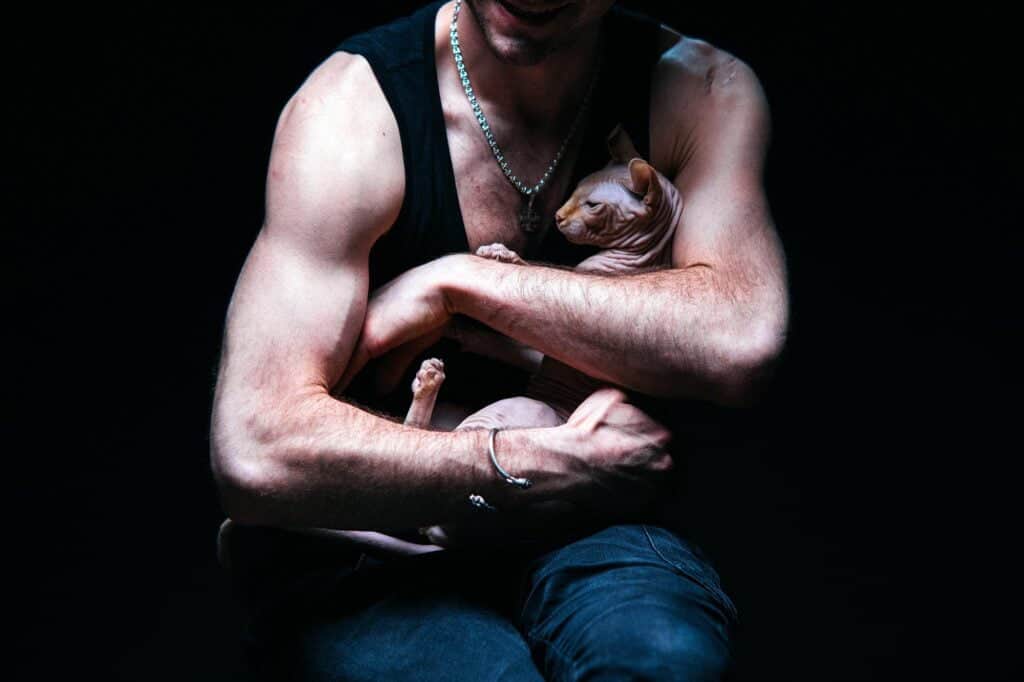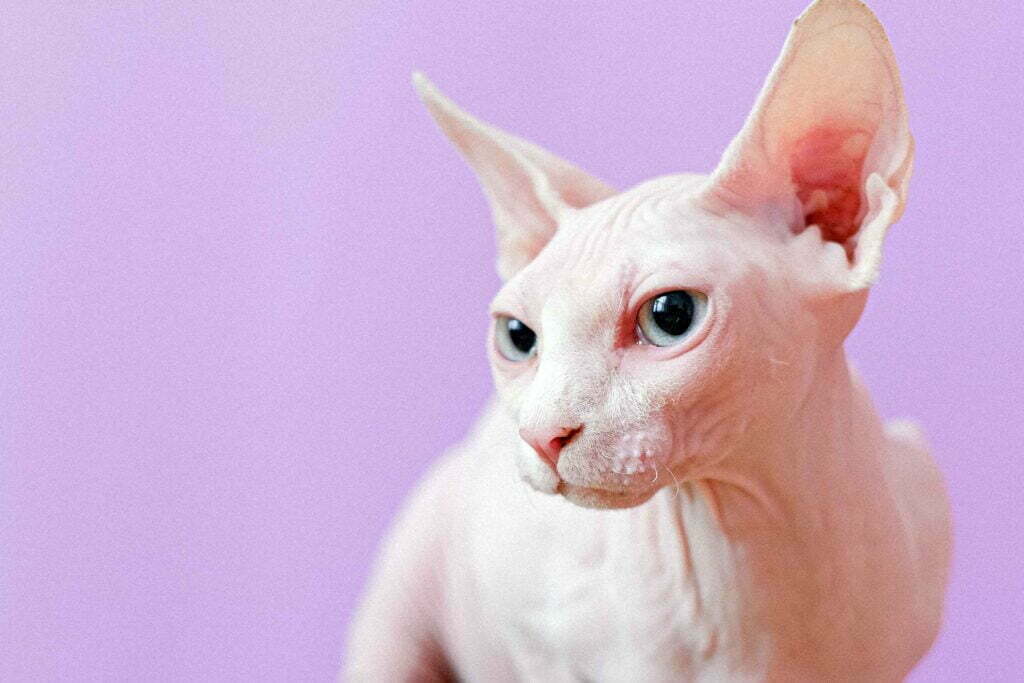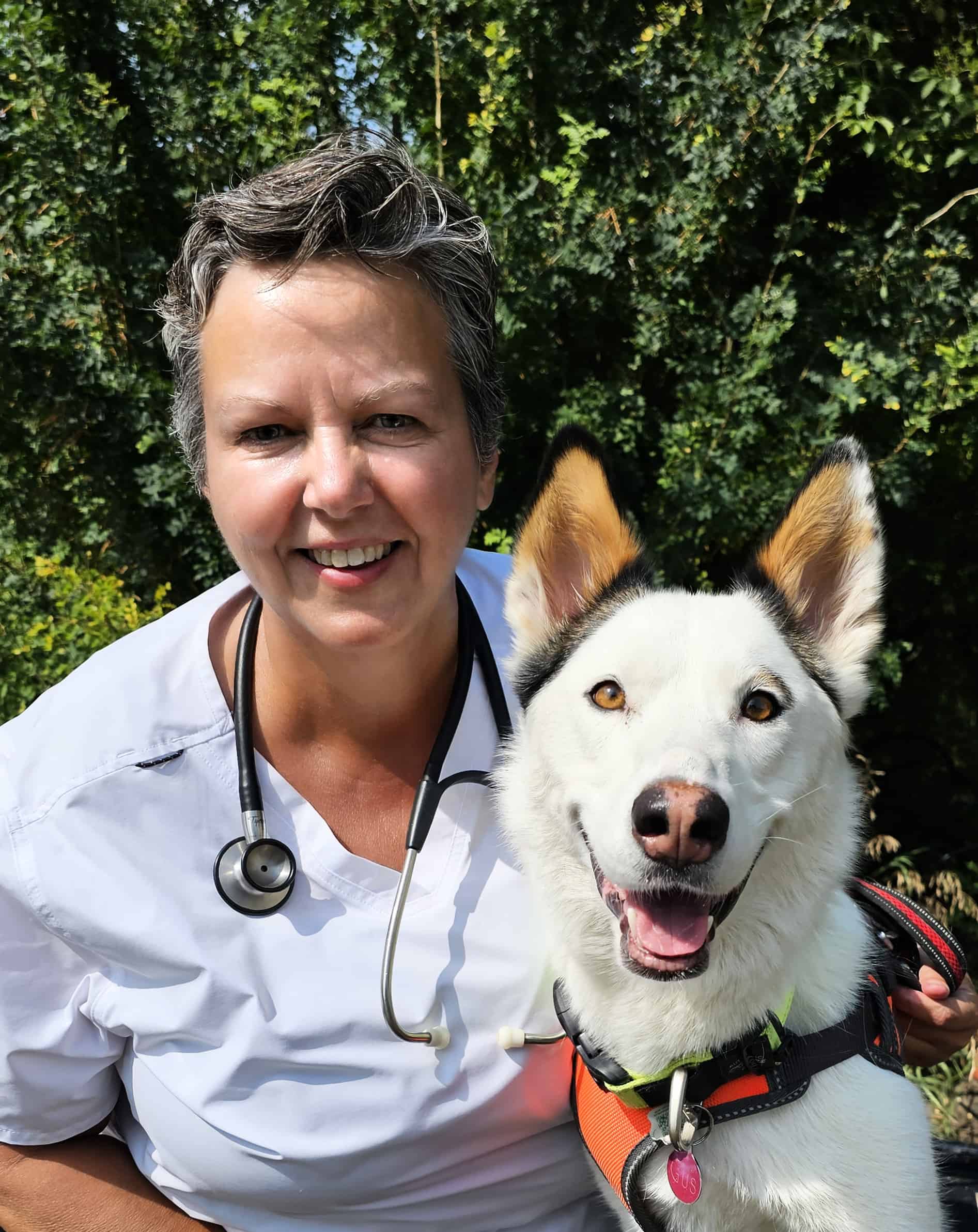Last Updated on May 18, 2024 by Dr. Wendy Wilkins, DVM, PhD
Did something different catch your eye and your interest? Was that something a Sphynx cat? Do you want to know more about this breed?
Sphynx cats are an intriguing, hairless breed of cat that has become increasingly popular in recent years. They have a loyal fan base and they make excellent companions. But before you invest in one of these unique cats, there are some important things to know about their care requirements.
It’s important for potential owners to understand what these needs are before bringing home one of these cats. This article will provide you with information that will help you decide if a Sphynx cat is the right fit for your family, your home, and your lifestyle.
Origins
The Sphynx cat is a relatively new breed of cats, with origins traced to Ontario, Canada, and Minnesota, USA. It results from a mutation of the same gene that causes the soft, curly coat of the Devon Rex breed.
The first hairless cat in the breed was a single male kitten in a litter born to a domestic shorthair cat located in Ontario. This hairless male was then mated to his mother, which resulted in one more hairless kitten.
These two kittens were the foundation of the “Canadian Sphynx” breed, also known as the Bawa line. Ultimately, this line of cats was not able to reproduce well and the line petered out in the 1980s.
This was not the end of the sphynx hairless cat breed though. Two new foundation lines emerged in the 1970s and 1980s.
The first line involved hairless kittens from several litters from one domestic shorthair female, also in Ontario. These cats were then bred to a Devon Rex, resulting in kittens with different degrees of hairlessness.
The second line started with hairless kittens found in several litters born to domestic shorthair cats in Minnesota. These cats were used in two separate breeding programs, where they were crossed with American Shorthair and Cornish Rex cats.
A deeper gene pool was created by further selective crossing with American Shorthair and Devon Rex breeds. The Sphynx breed gained acceptance by The International Cat Association (TICA) in 1985 and the American Cat Fancier’s Association (ACFA) in 1994.
Sphynx Cat Characteristics
Intelligence
Sphynx cats are known to be very clever and independent. They have an excellent memory and are fast learners. They often pick up on commands quickly and love puzzles and interactive cat toys. They also enjoy exploring new spaces and getting into mischief, making them a great companion for a playful household.
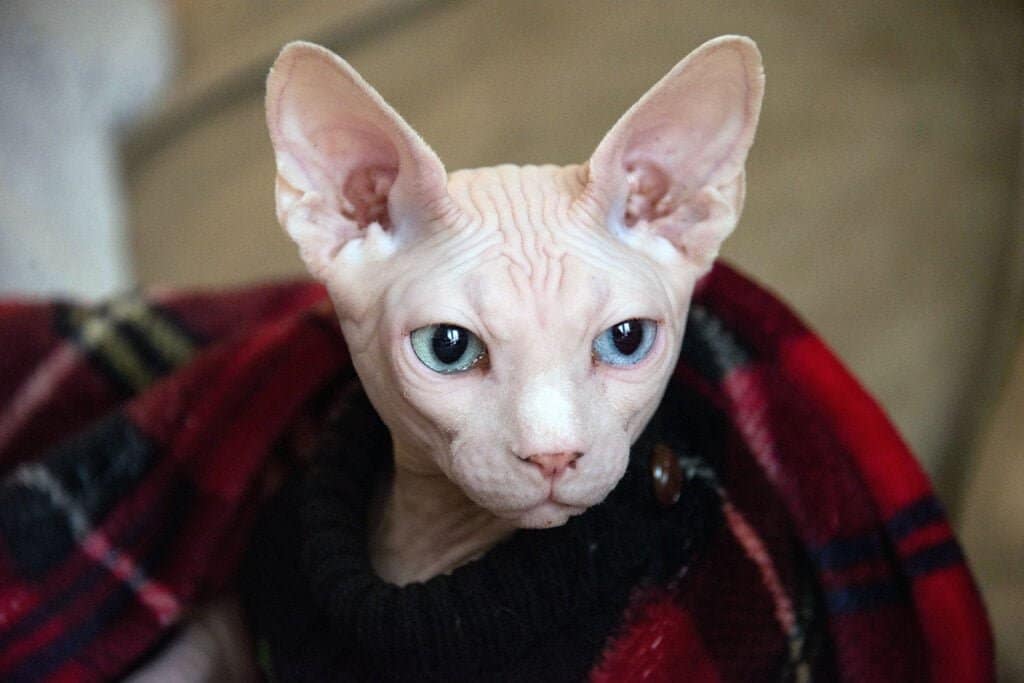
They Are Affectionate
These cats are very affectionate, loving, and loyal. They enjoy being around their owners and crave human attention and affection. They also are known to form strong bonds with their owners and can demonstrate a lot of loyalty. Despite their lack of fur, they are still cuddly cats who enjoy snuggles and lap time with their people.
They Are Friendly With Other Animals
Sphynx cats can be very friendly with other animals, especially if socialized at a young age and given proper introductions. They are known to get along well with other cats, dogs, and small pets such as rabbits or guinea pigs if introduced correctly.
Sphynx cats are also highly intelligent, so if their owners spend time helping them learn how to properly interact with other animals there should be few problems.
They Are Good With Children
Sphynx cats can be very good with children. Their playful nature and reputation for being loving and gentle can make them the perfect cat to have around children.
These cats thrive when given plenty of attention from their owners, so both the child and the cat can benefit greatly from each other’s company. As with any cat, care must be taken when introducing a Sphynx cat to very young children, it is important to supervise and teach both the children and the cat how to properly interact with each other.
Personality
Intelligent and affectionate, these cats have a reputation for being loyal and playful and will actively seek interaction with their owners. They will frequently be seen following their owners around the house or cuddling up in bed with them.
These cats love to explore and be part of whatever activities their family is engaged in. They do not do well on their own since they require lots of companionship, so it is important that they live in households where someone will regularly interact with them.
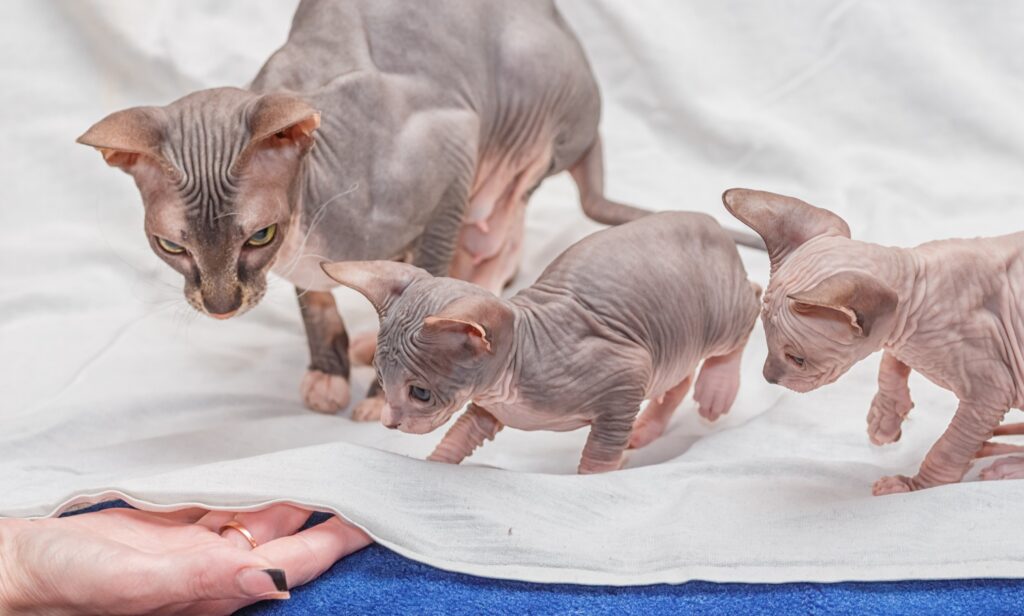
Vocalization
Pay attention to me right meow! Sphynx cats are known to be very vocal and will meow loudly if they need attention or want something from their owners. It can be stressful for owners to have their cat meowing at them all the time, so be sure that a chatty cat is something you can handle before getting a Sphynx.
Energy Level and Exercise Needs
Sphynx cats are not lazy, and their energy level is quite high. They love to play and need plenty of mental stimulation and physical exercise to keep them entertained. This could include anything from puzzle toys and games to chasing feather toys or laser pointers.
They also enjoy playing fetch with their owners or getting up on top of furniture and exploring around the house. Expect them to figure out how to get to the highest point in every room in your home!
Regular daily playtime should be part of a Sphynx cat’s routine to ensure they remain healthy and happy.
Are Sphynx Cats Easy to Train?
The Sphynx cat’s intelligence and energy level means they need plenty of mental and physical exercise every day to stay happy. Their ability to quickly learn new things means that they are amenable to being trained.
Patience and consistency are the key to successful training. Harsh punishments should never be used as this could lead to behavioral issues. Providing regular playtime and positive reinforcement are the keys to successfully training a Sphynx cat.
Sphynx Cat Appearance
Size
Sphynx cats are a medium-sized breed. Females may weigh as little as 6 lbs whereas males can reach 14 lbs. The average size is usually between 8-12 lbs.
Coat Type
Sphynx cats are a unique breed, known for their distinctive lack of fur. These elegant creatures typically have wrinkled skin, especially in their folds and creases.
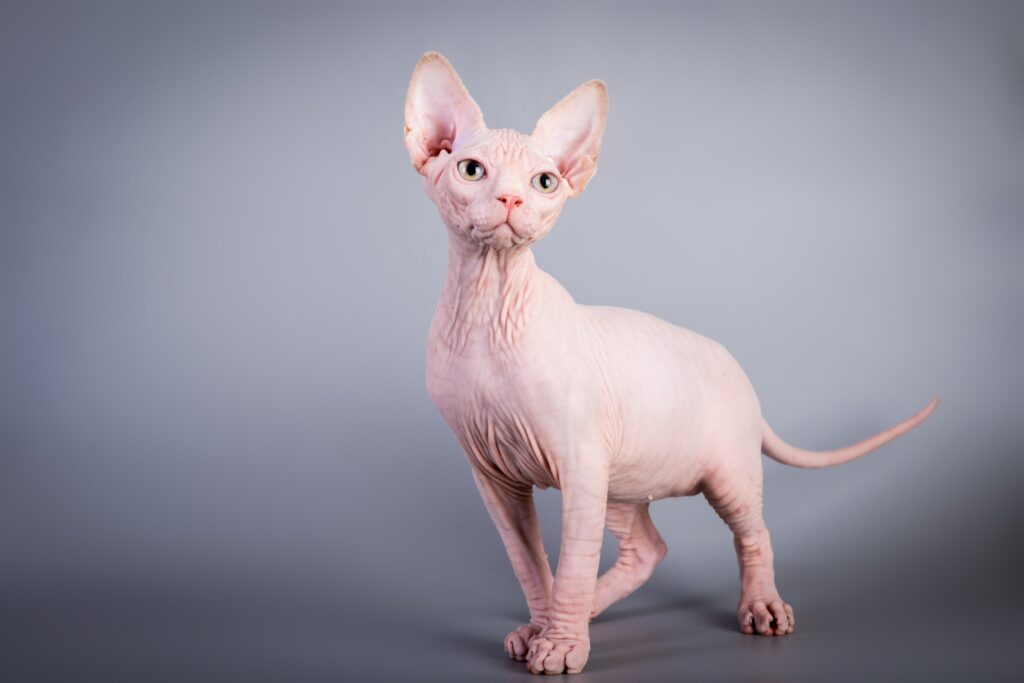
These cats have unique skin that is often described as feeling like suede or chamois. They have a warm, soft feel and are not at all prickly or harsh. It also has a slight sheen, caused by natural skin oils that would normally be wicked away from the skin by their fur (if they had any!).
While Sphynx cats are considered “hairless”, in truth they have very short, fine hair. This is often referred to as “down”, and can best be seen when looking at the cat in bright sunlight. This downy hair may also thicken during winter.
Some of these cats will also have patches of hair, rather than being totally bald. It is not an uncommon occurrence; however, these more hairy Sphynx cats do not meet registered breed standards. They still make wonderful pets though!
Because they lack a thick fur coat, these cats need warm room temperatures or supplemental heat sources. Learn more about the right temperature for Sphynx cats in our article on the topic found here.
Whiskers
Some Sphynx cats have no whiskers. Others may have whiskers, but they will be sparser as well as misshapen. These will not be as long or thick as regular cat whiskers, though they can still help the cat sense its environment and detect movement in the air.
Color
The color of Sphynx cats reflects the range of colors that can be seen in furred cat breeds. Their skin color can be white, cream, grey, black, brown ,or any shade variation of these.
Coat Patterns
Again, like other cats, Sphynx cats can come in a variety of patterns. Bicolor is common, such as patches of white and black or grey skin. Calico, tortoiseshell, pointed, mink, and tabby patterns also occur. There are no limitations on Sphynx coat color or patterns, and all are acceptable according to breed standards.
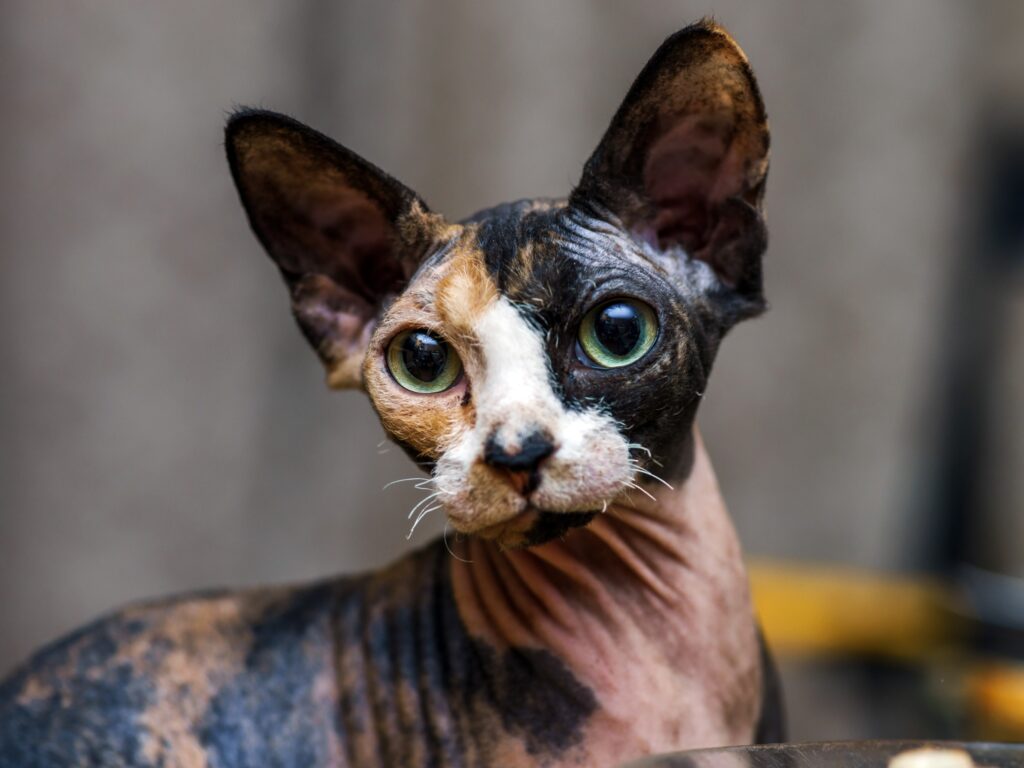
Eye Color
Often the first thing people notice about Sphynx cats is their large, bright eyes. Sphynx cats can have a variety of eye colors, ranging from deep blue and green to yellow and amber. Some cats even have eyes that are two different colors, known as ‘odd-eyed’.
The color of their eyes is strongly linked to their skin color, just as it is for cats with fur. White/peachy colored cats often have very pale blue eyes which are sensitive to bright light.
Body Type
Sphynx cats have large ears and big eyes, giving them an alert yet friendly expression. Their face is wedge-shaped with a squared muzzle. Their face has varying degrees of wrinkles which, combined with their large eyes, results in comparisons to “gremlins” or “aliens” in appearance.
Sphynx cats have a muscular, athletic build, which gives them impressive weight and strength for their size. Their tails are long, slender, and incredibly whip-like, and often have a tuft of hair at the end. Long legs and strong claws make them excellent runners and climbers.
Lifespan
The average lifespan of a Sphynx cat is between 10-15 years. Of course, proper care and health maintenance are key to ensuring that they live a long and healthy life. However, they are prone to certain breed-related diseases that can reduce life expectancy even with the best of care.
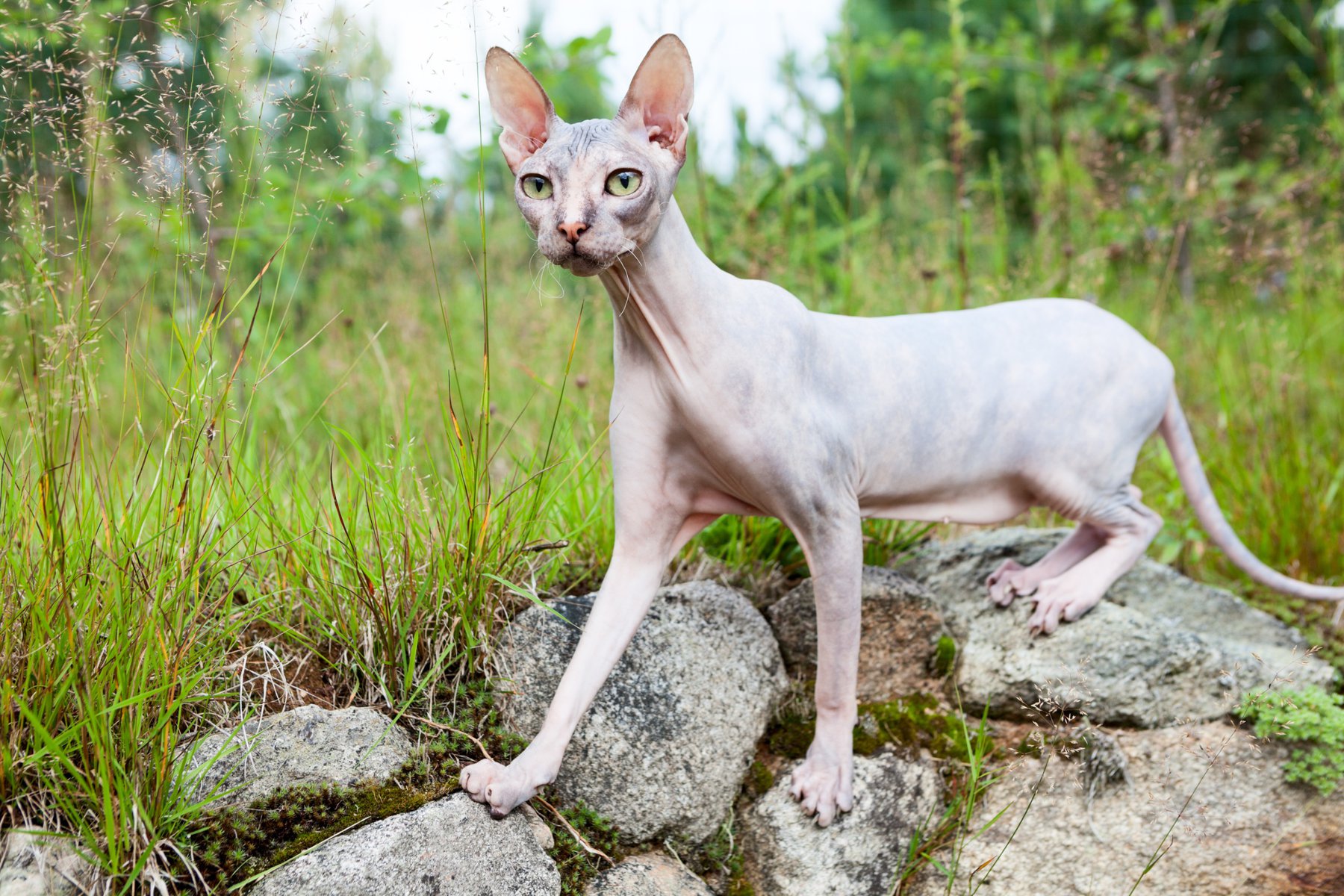
Health Issues
Despite generally good health overall, Sphynx cats are still vulnerable to the same health issues as other cat breeds. Additionally, they may be more likely to experience certain genetic ailments that can be identified through either genetic testing or routine health checks.
Three of the most common health issues in Sphynx cats include:
- Feline hypertrophic cardiomyopathy (HCM): HCM is an inherited heart disease that affects Sphynx and other breeds of cats. This disease results in the thickening of the walls of a cat’s heart, which reduces heart efficiency. There is no genetic test for this. Breeding animals should be examined regularly by a vet, and any animal that develops HCM must not be used for breeding.
- Hereditary myopathy: This hereditary disease of Sphynx cats causes generalized muscle weakness resulting from an interruption in the pathway between nerve signals and their response by muscles. Affected cats may have difficulty walking and exercising normally due to muscle weakness. They will tire quickly and are prone to muscle tremors and collapse. Some cats will develop megaesophagus. Breeding animals should be tested and any carriers removed from breeding programs.
- Skin problems: Their naturally hairless state results in increased susceptibility to skin problems. Their skin is less protected than that of haired. Sphynx cats have very sensitive skin and can be prone to skin infections, allergies, and dermatologic conditions. These cats should be groomed regularly with frequent baths to remove dirt and oil buildup that can lead to skin problems. Itchy cats need a visit to their veterinarian. Some cats may benefit from clothes that help protect their sensitive skin.
Sphynx Cat Care
Grooming
Being hairless, one might make the mistake that Sphynx cats need less grooming than haired breeds. In fact, quite the opposite is true.
Because they are hairless, Sphynx cats need frequent grooming to keep their skin healthy and free of dirt and oils. A cat’s fur normally wicks the skin’s oil up and away from the skin, keeping the hair shiny and soft. The Sphynx has no hair to do this job, so you must do it for them .
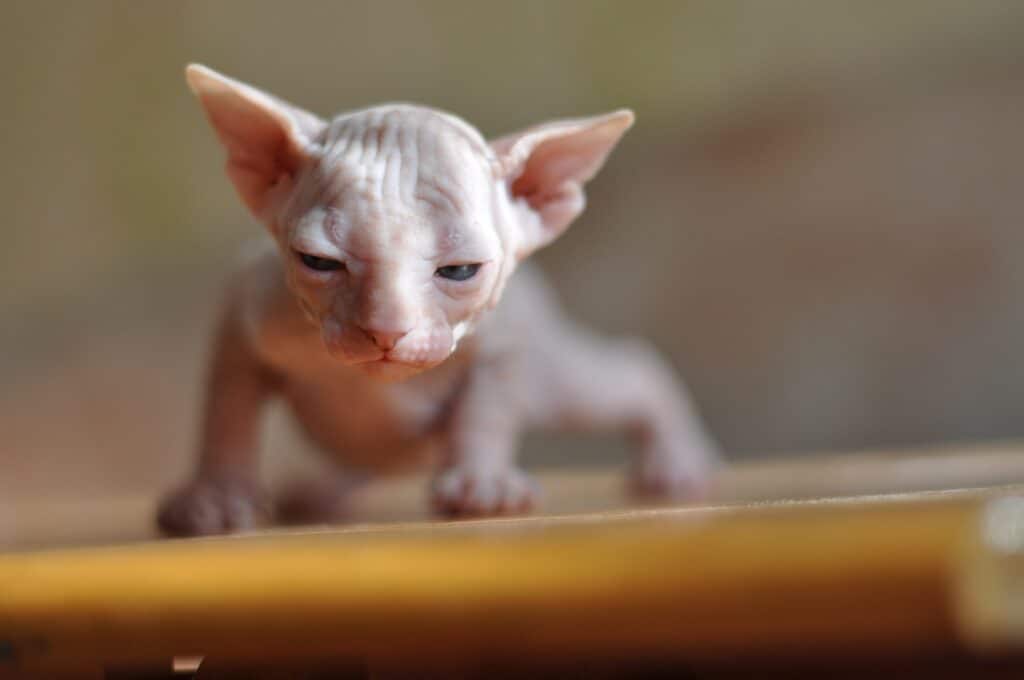
These cats need to be bathed regularly. Many breeders and owners recommend weekly baths, but this can vary although it should be once monthly at minimum. Only use shampoos formulated for their sensitive skin.
Failure to bathe these cats regularly not only increases the risk of skin problems in the cat, but is also hazardous for your furniture, blankets, pillows or any other surface your cat decides to lay on. This is because the oils from their skin will be transferred to these surfaces, resulting in stains. It also causes greasy hands when you pet them!
It is also important to keep their ears and eyes clean, as these cats are prone to ear infections and eye discharge. Regularly check your Sphynx cat’s ears and eyes for any signs of infection or irritation, and wipe away visible dirt and debris with a soft, warm washcloth. If you notice anything abnormal, take them to the vet right away.
Diet And Nutrition
Sphynx cats do not need a specialized diet. However, it can be a fine line between providing them with the calories they need and providing them with too many calories which results in in fat cats.
Because they are hairless, Sphynx cats spend more energy keeping themselves warm. As such, they tend to need to eat more calories. There are commercial cat foods formulated for the Sphynx breed which are primarily different from other cat foods in that they have a higher calorie content.
On the other hand, if your Sphynx is less active, or better than the average Sphynx at finding nice warm places to sleep, then the extra calories may not be needed. In this case, any “extra” calories you provided will result in weight gain.
Other than that, Sphynx cats eat the same foods that other house cats do. Some owners may choose to feed a raw diet, while others will choose a commercial cat food that is more convenient.
Whichever food you feed your cat, the important thing is that it is a well-balanced diet made of quality ingredients. Raw food diets can be tricky to balance yourself, due to the specific nutritional needs of cats.
If you do feed a raw food diet, do so in consultation with a pet nutritionist or your veterinarian to be sure your cat’s nutritional needs are being met.
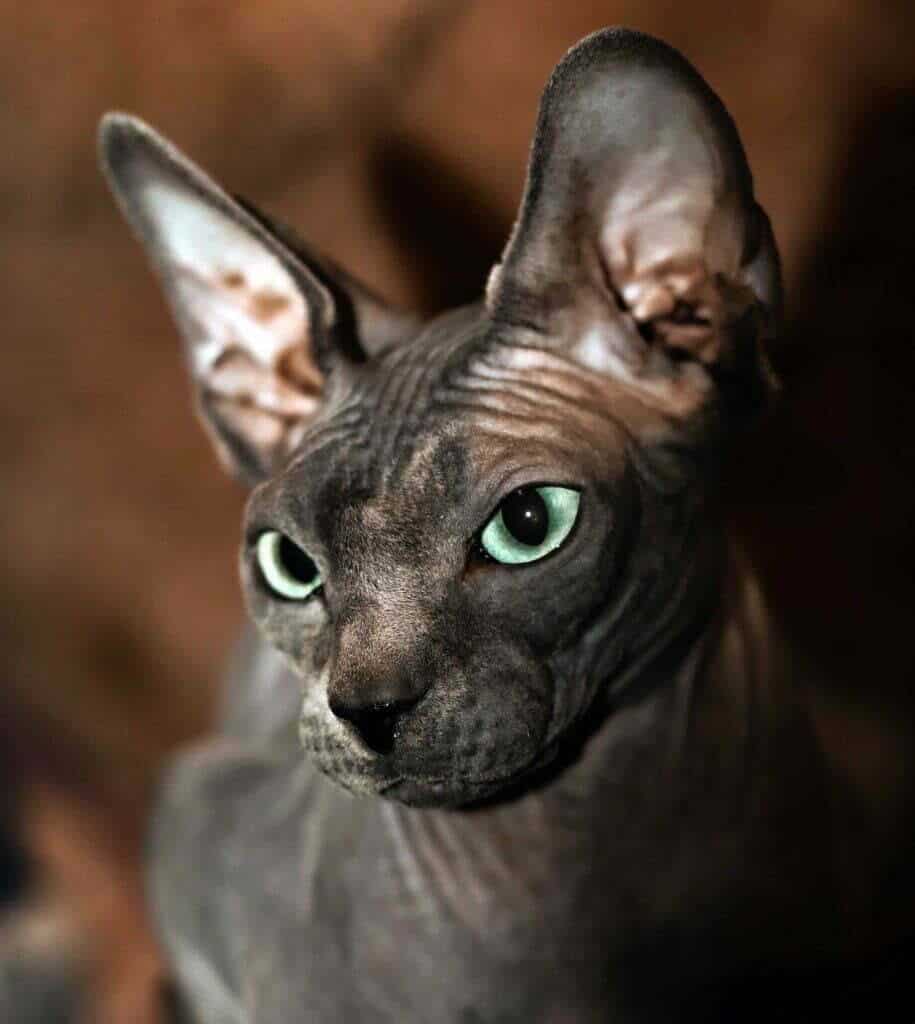
Are Sphynx Cats Hypoallergenic?
The Sphynx cat is often thought to be hypoallergenic due to the lack of fur. Unfortunately, this isn’t true – all cats produce dander and allergens that can cause reactions in some people. While the absence of fur may reduce the amount of allergens present in a home with a Sphynx, it is not a guarantee that all people will be unaffected by allergies.
Allergic individuals should take care to test their own sensitivity levels before deciding to bring any pet into the home.
Where To Buy Sphynx Cats
Sphynx cats are still an uncommon breed and it may be difficult to find kittens for sale in your area. They are also unlikely to be found in your local animal shelter – if one does arrive at a shelter, it is usually adopted out very quickly.
When searching for a reputable Sphynx cat breeder, look for ones that are registered with TICA, test their cats for genetic diseases, and provide health guarantees. This breeder list might help you find one in your part of the world.
Keep in mind that even if you cannot find a breeder near you, many breeders have experience with shipping kittens to new owners. Some will even make the delivery themselves, at a cost.
Sphynx Cat Price
These days, the price of Sphynx kittens starts at around $1500 USD and goes up from there. Show-quality, rare colors, or breeding stock can sell from $4500 – $10,000 USD.
Conclusion – The Nitty Gritty About This Kitty
Overall, the Sphynx cat is a fascinating breed that offers something quite unique. However, these cats have some special requirements when it comes to their care.
They differ most from other cat breeds in that they have more regular and specific grooming needs. They may also require a higher-calorie diet to compensate for the lack of fur, as well as frequent monitoring for skin infections.
Sphynx cats are expensive and not always easy to come by. If you’re considering one, make sure you do your homework and find a reputable breeder.
If, after learning as much as you can about the breed, you decide you’re up for the challenge, get ready to welcome a loving, friendly, and unique companion into your home.
